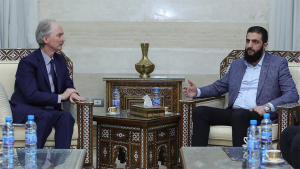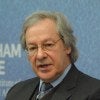Syria's Revolution, Europe's Support for Ukraine, and Trump's Media Battles
 Play Video
Play Video
About This Episode
In our final episode of 2024, we’ll dig into the stories that are not only dominating the headlines this week but also will command attention well into 2025. First, how is the Syrian revolution already reshaping the Middle East and how will it affect the balance of power in the region? Then, European leaders, including Ukraine’s President Volodymyr Zelenskyy and NATO chief Mark Rutte, gathered in Brussels this week ahead of US President-elect Donald Trump’s inauguration to discuss support for Ukraine. What do Trump, Europe, and Zelensky want? Finally, we’ll wrap up by addressing President Trump's renewed hostility toward the press and examine what it might mean for press freedom during his second term. Steven Erlanger, Bobby Ghosh, and Carla Anne Robbins join Ivo Daalder to discuss the week's top news stories on World Review.
While we encourage you to watch or listen to the episode (and subscribe wherever you get your podcasts!), these are Ivo's top takeaways from today's discussion:
- Since rebel forces ousted the long-time dictatorship of the al-Assad family less than two weeks ago, we have learned more about the monstrous ways the regime treated its own people. Justice will take a very long time to come. But for now, the mood inside the country remains buoyant, as people celebrate the ouster of Assad and slowly start to figure out how to remake their lives. The incoming government led by Hayat Tahrir al-Sham (HTS) seems to be focused on the future and the people rather than on exacting revenge for the past. Its leader, Abu Muhammad al-Jawlani, is saying all the right words, including Bobby mentioned, reassuring statements towards Israel—a true novelty for any Islamist. But there are plenty of reasons to worry. The scale and scope of the rebuilding needs inside Syria is truly extraordinary—the country has been effectively destroyed. It hasn’t had a united government since the civil war began in 2011. And outside powers seek to influence what is happening inside—from Turkey in the north, to Israel in the south, and Iran and the Gulf States in the east. Washington is also paying close attention, doubling the number of forces now in country to combat ISIS and sending three senior diplomats for talks in Damascus. And Russia wants to retain its influence which it has long asserted through its permanent military presence in the country.
- Meanwhile, in Brussels this week, European leaders gathered for their first meeting with the new European Council president, Antonio Costa, and the new EU Commission. Also in town, Volodymyr Zelensky. The Ukrainian president was hosted for dinner by the NATO Secretary General Mark Rutte, who also invited key European leaders, including the UK. But not the United States. The purpose of the meeting was to get agreement on Europe’s stance towards Ukraine. Afterwards, Rutte, new EU High Representative Kaja Kallas, and others made clear that talk about peace or a ceasefire was premature. The focus had to be on sustaining support for Ukraine so that it could negotiate an end to the war from a position of strength. Steve suggested that all the talk about weak European leadership and divisions over Ukraine were misplaced. The events this week underscored that Europe knows what it wants and is determined to help Ukraine. There is plenty of money for now; the question is whether it will be used to buy equipment on the world market or to get it from the United States.
- Finally, press freedom around the world is under challenge—including in the United States. The media have been challenged for quite a while, with declining ad revenue and the emergence of alternative sources of information — much of it opinion-based rather than the kind of in-depth reporting that is critical to holding those in power accountable. In Hungary and elsewhere, leaders have looked to friendly oligarchs to buy up media outlets and bias coverage by curtailing criticism of leaders. Independent voices have been shut down in places as different as Turkey and India (not to mention Russia and other autocracies). The US still enjoys a free media, Carla pointed out, but there were worrying signs. ABC’s decision to settle with Trump on a spurious defamation suit, the influence of billionaires on curtailing criticism of Trump in the media they have owned, the rise of social media as a main source of information for many, and threats to use the long arm of the state to silence critical voices do not bode well for the vital role the Fourth Estate has played for so long to maintain democracy.
That’s it for Ivo's quick takes of this week’s episode. The show will take a three week break, but we will be back on January 10 with a new episode. To get the full flavor, please watch or listen to the episode.
Prefer to Listen?







